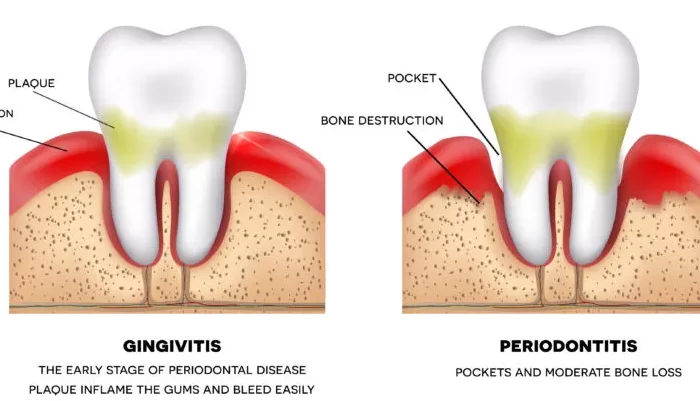Periodontal disease, also known as gum disease, is a common but serious infection that affects the gums and bones supporting your teeth. If left untreated, it can lead to tooth loss and other health complications. It’s important to recognize the warning signs and seek early treatment to prevent further damage.
Stages of Periodontal Disease
Periodontal disease progresses in stages, from mild gingivitis to advanced periodontitis.
Gingivitis: This is the mildest form of gum disease, characterized by red, swollen, and bleeding gums. Gingivitis is reversible with proper oral hygiene practices.
Periodontitis: This is a more severe form of gum disease where the infection spreads beyond the gums and affects the bone and ligaments supporting the teeth. Periodontitis can lead to tooth loss if left untreated.
SEE ALSO: How to Combat Periodontal Disease
Recognizing The Warning Signs of Periodontal Disease
While the early stages of gum disease may not be noticeable, certain symptoms can indicate its presence:
Bleeding Gums: Bleeding gums, especially when brushing or flossing, is a primary sign of gum disease.
Swollen or Red Gums: Inflamed gums may appear red, swollen, or tender to the touch.
Receding Gums: As the disease progresses, the gums may pull away from the teeth, exposing the root surfaces.
Persistent Bad Breath: Periodontal disease can cause a persistent bad breath that doesn’t go away with brushing.
Loose Teeth: In advanced stages, the infection can weaken the bone and ligaments, causing teeth to become loose.
Pain or Sensitivity: You may experience pain or sensitivity when chewing, especially on the affected teeth.
Pus Formation: If you notice pus around your teeth or gums, this is a clear sign of an infection and needs immediate attention.
Changes in Bite: As the infection progresses, your bite may change, causing difficulty chewing.
Visible Gaps Between Teeth: As bone loss occurs, gaps may appear between your teeth.
Importance of Early Detection
Catching periodontal disease in its early stages is crucial for preventing serious complications. Regular dental checkups and cleanings are essential for detecting and addressing gum disease before it progresses.
Who Is at Risk for Periodontal Disease?
Certain factors can increase your risk of developing periodontal disease:
Poor Oral Hygiene: Failure to brush and floss regularly allows plaque and calculus to build up, leading to gum disease.
Smoking: Smoking weakens the immune system and compromises blood flow, making it harder for gums to heal.
Diabetes: Diabetes weakens the immune system, making individuals more susceptible to infections, including periodontal disease.
Genetic Predisposition: Some people are genetically predisposed to gum disease.
Certain Medications: Some medications, such as those that suppress the immune system, can increase the risk of gum disease.
Stress: Chronic stress can weaken the immune system and contribute to gum disease.
Hormonal Changes: Hormonal changes during pregnancy, puberty, and menopause can increase the risk of gum disease.
What to Do if You Suspect Periodontal Disease
If you experience any of the warning signs of periodontal disease, it’s crucial to see your dentist immediately.
Treatment Options for Periodontal Disease
Treatment for periodontal disease aims to control the infection, prevent further bone loss, and preserve your teeth.
Scaling and Root Planing: This procedure removes plaque and calculus from above and below the gum line, smoothing the root surfaces to reduce bacteria buildup.
Antibiotics: Antibiotics may be prescribed to control infection.
Surgery: In severe cases, surgical procedures like flap surgery or bone grafts may be necessary to repair damaged tissues and regenerate bone.
Home Care: Maintaining good oral hygiene, including regular brushing, flossing, and using an antibacterial mouthwash, is essential for managing periodontal disease.
Preventing Periodontal Disease
Preventing periodontal disease is crucial for maintaining long-term oral health.
Brush Your Teeth Twice Daily: Use a soft-bristled toothbrush and fluoride toothpaste.
Floss Daily: Flossing removes plaque and food debris from between teeth, where your toothbrush can’t reach.
Use Mouthwash: An antibacterial mouthwash can help reduce bacteria in your mouth.
See Your Dentist Regularly: Schedule professional cleanings and checkups at least twice a year.
Quit Smoking: Smoking increases the risk of periodontal disease and hinders healing.
Manage Diabetes: Keeping your blood sugar levels under control can reduce the risk of gum disease.
The Link Between
Periodontal Disease and Overall Health
Research shows that periodontal disease is not just a problem for your teeth and gums. It can have a negative impact on your overall health, increasing your risk of:
Heart Disease: Periodontal disease is linked to inflammation
throughout the body, increasing the risk of heart disease and stroke.
Diabetes: Periodontal disease can worsen diabetes control by making it harder for your body to regulate blood sugar levels.
Respiratory Diseases: Periodontal bacteria can travel through the bloodstream, increasing the risk of pneumonia and other respiratory infections.
Premature Birth and Low Birth Weight: Periodontal disease is linked to an increased risk of premature birth and low birth weight in pregnant women.
Osteoporosis: Periodontal disease is linked to increased bone loss, which can contribute to osteoporosis.
Conclusion
Periodontal disease is a serious infection that can lead to tooth loss and other health problems. Recognizing the warning signs and seeking early treatment are essential for preventing further damage.
Maintaining good oral hygiene, seeing your dentist regularly, and addressing any risk factors can significantly reduce your risk of developing gum disease. Remember, taking care of your oral health is crucial for overall well-being.

